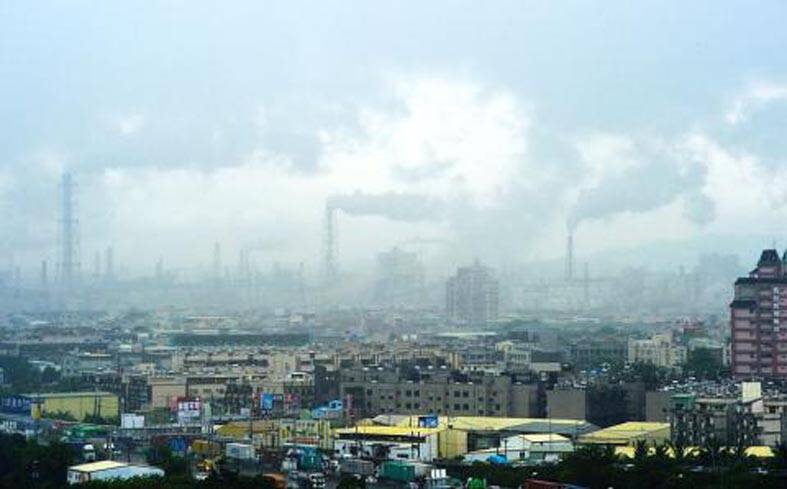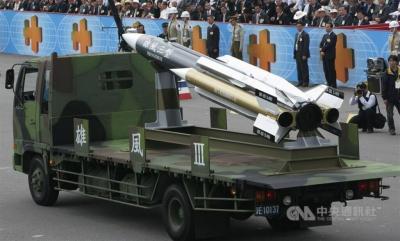Exposure to air and noise pollution could quadruple the risks of cardiovascular diseases, diabetes and other conditions that fall under metabolic syndrome, a Taiwanese study published in Science Reports Wednesday last week showed.
Coauthor Chan Ta-chien (詹大千), a research fellow at Academia Sinica’s Research Center for Humanities and Social Sciences, conducted the study using the health records of 1.7 million people and pollution data in Taipei from 2010 to 2016.
The research revealed that exposure to PM2.5 concentrations of 19.78 micrograms per cubic meter or more for just 24 hours per month was enough to cause a four-fold increase in metabolic syndrome risks, the epidemiologist said yesterday.

Photo: Chang Chung-i, Taipei Times
PM2.5 is particulate matter with a diameter of 2.5 micrometers or smaller.
The same length of exposure per month to noise pollution equal to or exceeding 67.77 decibels doubled metabolic syndrome risks while exposure to both types of pollution increased the risk by 3 percent over simple exposure, he said.
The PM2.5 and noise pollution levels used in the study were the average amount for urban areas near major traffic arteries, Chan said, adding that mixed residential and commercial zoning provides convenience to the detriment of public health.
The government can reduce the negative health impact of air and noise pollution originating from traffic by promoting public transportation and electric vehicles, while people can protect themselves by installing hermetically sealed windows and purifiers, he said.
In addition, green plants on balconies or window boxes can be used to absorb some of the PM2.5 pollution, he said.
In related news, a sustainability project funded by Academia Sinica showed that green curtains made of spider plants, sword ferns and regular ferns could help curb PM2.5 in urban areas.
A prepublished version of the study is available on the Building and Environment Web site.
The research team said that a green curtain consisting of 60 plants, which could be fitted in a 4.5 ping (15m2) balcony could remove 15 percent of PM2.5 in the surrounding air.
The plant types used in the study were selected for their suitability to subtropical climate and minute striations of their leaves that form dew to capture particulate matter, said coauthor Tsay Yaw-Shyan (蔡耀賢), professor of architecture at National Chung Kung University.
The plants do not require washing to perform this function since they are effectively self-cleaning, he said, adding that green curtains suspended on surfaces prevent the plants from taking root in the structure.
People interested in using other plants for their green curtain should use begonia grandis or Japanese honeysuckle, said coauthor Chung Hsin-ying (鍾興穎), associate professor of plant industry at National Pingtung University of Science and Technology.
These plants have layered leaves with fluff and striations which are conducive to forming dew, he said, adding that cactuses and roses are not good as they are too smooth.

STATS: Taiwan’s average life expectancy of 80.77 years was lower than that of Japan, Singapore and South Korea, but higher than in China, Malaysia and Indonesia Taiwan’s average life expectancy last year increased to 80.77 years, but was still not back to its pre-COVID-19 pandemic peak of 81.32 years in 2020, the Ministry of the Interior said yesterday. The average life expectancy last year increased the 0.54 years from 2023, the ministry said in a statement. For men and women, the average life expectancy last year was 77.42 years and 84.30 years respectively, up 0.48 years and 0.56 years from the previous year. Taiwan’s average life expectancy peaked at 81.32 years in 2020, as the nation was relatively unaffected by the pandemic that year. The metric

Taiwan High Speed Rail Corp. (THSRC) plans to ease strained capacity during peak hours by introducing new fare rules restricting passengers traveling without reserved seats in 2026, company Chairman Shih Che (史哲) said Wednesday. THSRC needs to tackle its capacity issue because there have been several occasions where passengers holding tickets with reserved seats did not make it onto their train in stations packed with individuals traveling without a reserved seat, Shih told reporters in a joint interview in Taipei. Non-reserved seats allow travelers maximum flexibility, but it has led to issues relating to quality of service and safety concerns, especially during

A magnitude 5.1 earthquake struck Chiayi County at 4:37pm today, the Central Weather Administration (CWA) said. The hypocenter was 36.3km southeast of Chiayi County Hall at a depth of 10.4km, CWA data showed. There were no immediate reports of damage resulting from the quake. The intensity of the quake, which gauges the actual effect of a seismic event, measured 4 in Chiayi County, Tainan and Kaohsiung on Taiwan's seven-tier intensity scale, the data showed. The quake had an intensity of 3 in Chiayi City and Yunlin County, while it was measured as 2 in Pingtung, Taitung, Hualien, Changhua, Nantou and Penghu counties, the data

The Supreme Court today rejected an appeal filed by former Air Force officer Shih Chun-cheng (史濬程), convicted of Chinese Communist Party (CCP) espionage, finalizing his sentence at two years and two months for contravening the National Security Act (國家安全法). His other ruling, a ten-month sentence for an additional contravention, was meanwhile overturned and sent to the Taichung branch of the High Court for retrial, the Supreme Court said today. Prosecutors have been notified as Shih is considered a flight risk. Shih was recruited by Chinese Communist Party (CCP) intelligence officials after his retirement in 2008 and appointed as a supervisor